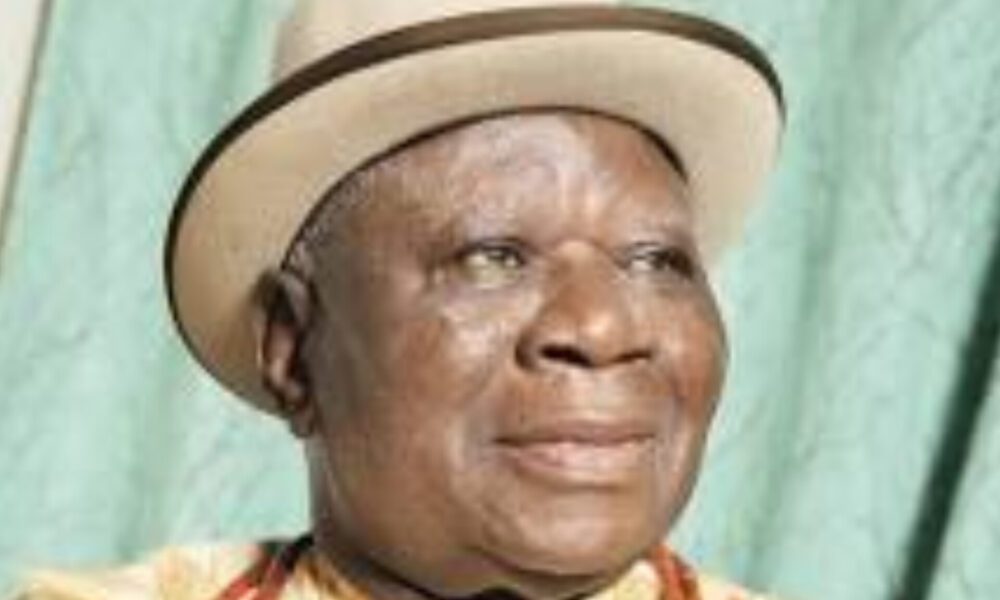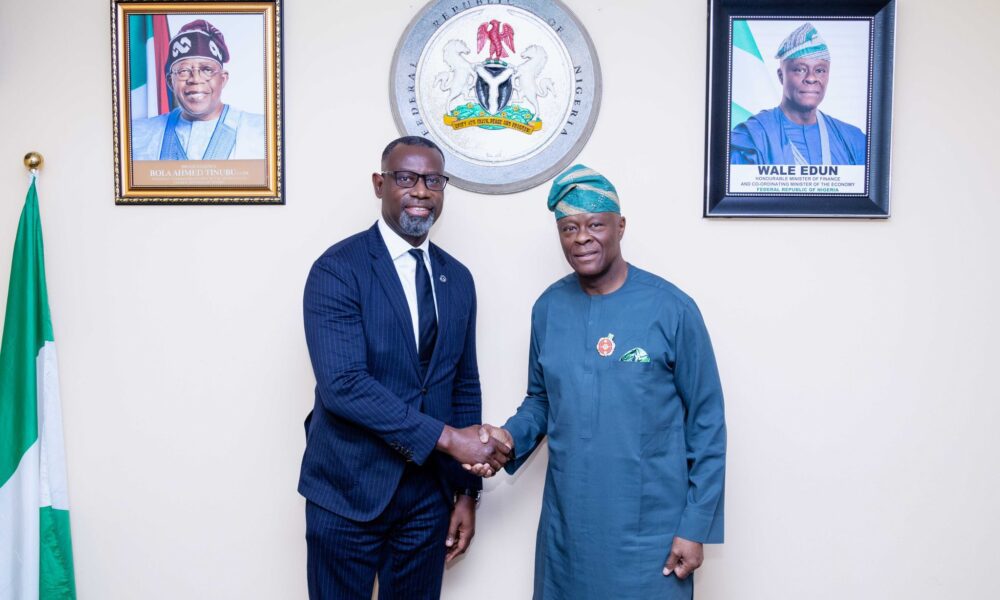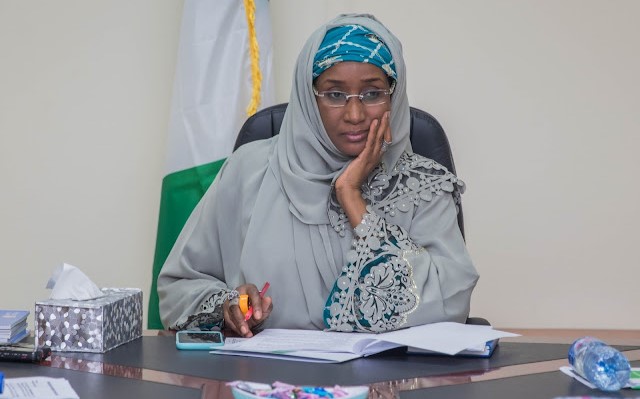**Restructure Nigeria in every ramifications
***Makes case for the Igbos to be given a sense of belonging
Elderstateman and leader of the Ijaw Nation Chief Edwin Clark has charge President Bola Ahmad Tinubu to immediately restructure Nigeria if the country is to continue to remain one nation.

He also appealed that the President take immediate action to implement the historic 2014 National Conference Report which submitted 600 recommendations to the Presidency on how to restructure Nigeria in every aspect of our lives.
These were contained in an open letter he addressed to the President titled, ‘A call for the urgent implementation of the 2014 National Conference Report to fully reintegration the Igbos and the political release of Nnamdi Kani as the case of the Miyetti Allah President, Alhaji Abdullahi Bello Bodejo(part 1)
“Now that the elections are over, we must face the restructuring of this country. I repeat again, the immediate restructuring of Nigeria must be carried out if this country is to remain one, and I appeal to Mr President to take immediate action to implement the historic 2014 National Conference Report.
“The Igbos of South-East or wherever they are in Nigeria, must stand up and assert their rights legitimately, judiciously and in a democratic way to benefit like any other Nigerian as it was before the civil war of 1967.”
He blamed Part of the insecurity situation in the South-East on some of the Igbo leaders themselves; some of whom have accepted the present situation in which they found themselves as second-class citizens in their own country.
This he said has been there since 1975 after the overthrow of Gen Yakubu Gowon and others who accept any positions they occupy as a favour from a fellow Nigerian. What a shame.
“There is another group who are selfish, greedy and who want to be neutral and believe in making money at the expense of their civil right and liberty and they are with any Government in power.
“Lastly is the group who are the majority; most of whom are righteously fighting for their own rights as Nigerians of equal status despite the Civil war and are ready to face any consequences arising from this marginalization, discrimination and oppression.
“In this group are young ones majority of whom their fathers were not born during the civil war and some of them grew up outside Igbo land; and even though the teaching of history has been abolished for sometime, they learnt a lot from their parents and they have experienced part of it.
“The Igbo social Cultural group, Ohaneze Ndigbo, which is today being manned by one of the most respected Nigerian, Chief Dr Emmanuel Iwuanyawu; who has seen it all; before the civil war, during the civil war and after the civil war and who is very courageous and fearless.
“He has been making every effort to project the status of the Igbo’s in Nigeria but unfortunately, his success has been limited by disunity of the Igbo leaders and his close relationship with the Governor of Imo State appears not to be helping matters.
“His predecessor in office, our most revered Ambassador, late Amb George Obiozor, a fine, experienced man with impeccable character also did his best but suffered untold humiliation by the so called unknown gunmen who burnt his house and destroyed properties worth Millions of Naira, perhaps because of the same close relationship with the Governor of Imo State.
“Is it not a shame that the Igbo man is humiliated and subjugated in Nigeria by his fellow Nigerian? Yet, some Governors and Ministers from the South-East hail the Federal Government for their personal success.
He said many Igbo leaders and politicians opted to be President of Nigeria in the 2023 Presidential election; instead of collaborating together, they all chickened out, as if they are the minorities of Nigeria.
“The role played by Sen Orji Uzor Kalu, the former Chief Whip of the Senate who threw his weight behind one of the presidential aspirant of APC, Sen Ahmed Lawan and he was ready to sweep the Aso Rock if Sen Lawan was elected President.
“His Excellency Chukwuemeka Ihedioha, former Governor of Imo State; gave the PDP delegates votes, for free, to Sen Aminu Tambuwal, former Governor of Sokoto State, a Presidential aspirant.
“The votes were then transferred, when he stepped down, to Alhaji Atiku Abubakar, another aspirant who eventually became the party’s candidate.
“The unwarranted disunity amongst the Governors of the South-East, to the extent that they could not maintain their security outfit, Ebube Agu, as it is with Amotekun of the South-West, where the Governors are solidly united.
“I am therefore appealing to all Igbos to put the interest of their Children and children yet unborn first, if they are to enjoy the same privileges bestowed on every citizen of Nigeria.
“Even though, I have made my observation about the action of some of my fellow igbo brothers, I have always had confidence that the Igbo’s fought for a course, during the civil war for a period of three (3) years. “After the war, no Igbo person was allowed to have more than 20 pounds, and today, the Igbos are among the wealthiest in the whole of Nigeria. “The Igbos are independent, resilient, industrious, determined, mentally and physically alert and courageous Nigerians and are now in a position to fight for their democratic right.
“I am proud and happy to say that the National burial given to our friend, Dr Chukwuemeka Ezeife, indicated that Igbos can come together to fight for their right democratically, even though they were handicapped in the past 25 years of democracy.
“The era of the civil war which I referred to earlier is gone forever. Nigerians should have the spirit of give and take and though tongue and tribe may differ but in brotherhood we stand, no brother should be superior to the other.
He asked rhetorically what was the status of the Igbo Leaders was between 1951 and 1966 and why are they now the most disadvantaged geopolitical zone in Nigeria after the civil war?
One of the setbacks for the Igbo’s, he observed was the continuous military rule between 1966 and 1999, where all the Military Heads of state came from the North, who had the opportunity to impose their will and desire on other parts of the country. “For instance Kano State had 44 local governments and when Jigawa States was created from it, Jigawa State was given 27 local governments while Kano state retained its 44 local Government. The whole of the Eastern Region made up of five (5) States has 95 Local Government, with only 24 Local Government more than Kano and Jigawa States in the North West region, which has seven (7) states and 186 Local Governments.
“The North East has 112 Local Governments, the North Central has 115 Local Governments, the South West has 137 Local Governments and the South-South has 123 Local Governments.
“Of the six (6) regions, the South-East has become the smallest region and has politically become the minority in Nigeria. You can therefore imagine that when the 36 State Governors are in Abuja for their monthly Federal Allocation, the South-East with the smallest number of local Government also receives the smallest allocation and in fact, the number of Local Governments in the North West is almost double that of the entire South-East region.
“At this juncture, it maybe necessary to mention a few conditions the Igbos of South-East are being subjected to as if they don’t enjoy equal status with the rest of Nigerians;
“The presence of five states in the south-east is a form of injustice when compared to the six states in other geopolitical zones and seven states in the North-West.
“The south east zone has been a victim of inequality, resulting in several agitations.
“I have said that Nigeria must be restructured to correct what i described as the imbalances and make every state equal in the country, stressing that, that was why the 2014 National Conference recommended the creation of more states, where the Southeast was given four additional states and three for all other zones except the North-West, which was allotted two because it already has seven states; and if implemented, it would have made the six geopolitical zones of the country to be at par with nine states”
He reterated the position that the implementation of the confab report would have provided for each citizen a stable and united Nigeria, where all its citizens have equal right.
“It was regarded as one of the most important recommendations of the conference because it affected every zone of the federation.”



